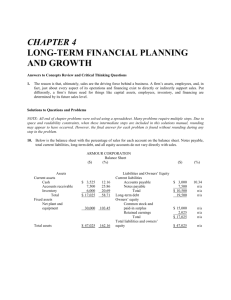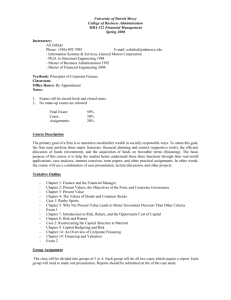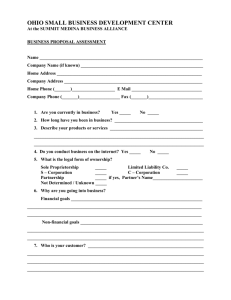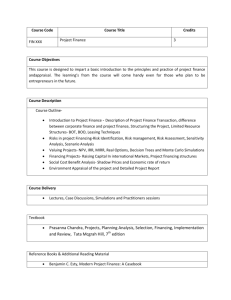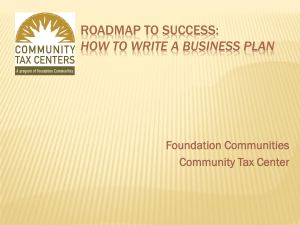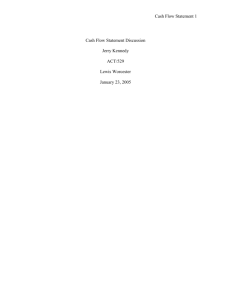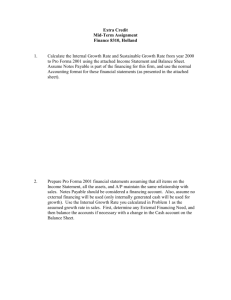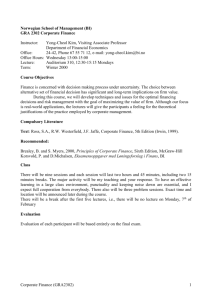Basic Principles of Accounting and Financial Modeling for
advertisement
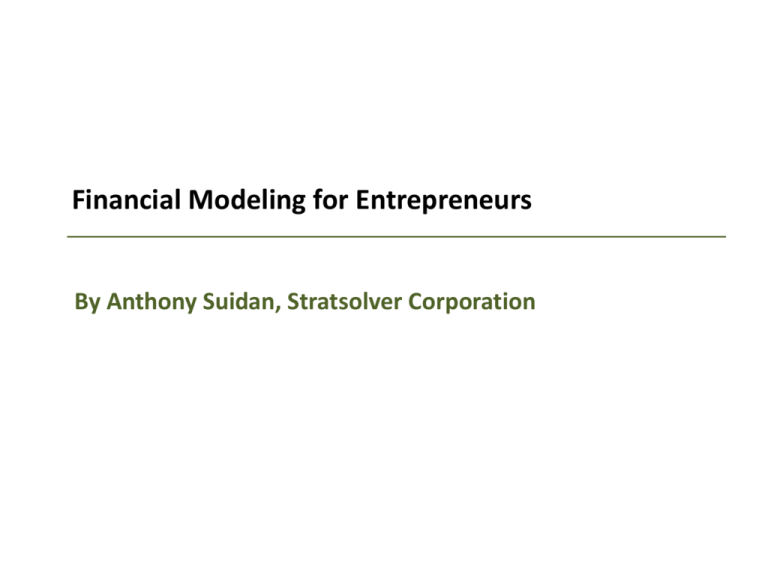
Financial Modeling for Entrepreneurs By Anthony Suidan, Stratsolver Corporation Topics 1. 2. 3. 4. 5. 6. Relevant Accounting Basics Financial Modeling Key Performance Indicators Perfecting Your Request for Financing Your Own Financial Model Little Andy’s Lemonade Stand 1. Relevant Accounting Basics Conventional Financial Statements Income Statement Balance Sheet Statement of Cash Flows Revenue Assets Operating Activities Current Assets Cash Accounts Receivable Inventory Long-term Assets Net Property, Plant & Equipment Revenue A Revenue B Revenue N Cost of Goods Sold Expense A Expense B Expense N Total Assets Gross Profit Liabilities Sales, General and Administrative Overhead A Overhead B Overhead N EBITDA Current Liabilities Accounts Payable Short-term Credit Long-term Liabilities Taxes Payable Long-term Credit Depreciation EBIT Interest Expense EBT Income Tax Net Income Ownership Equity Stock Retained Earnings Total Liabilities & Ownership Equity Net Income Accounts Receivable Inventory Accounts Payable Income Tax Payable Cash P (U) Operating Activities Investing Activities Property, Plant & Equipment Cash P (U) Investing Activities Financing Activities Short-term Credit Long-term Credit Issuance of Shares Dividends Cash P (U) Financing Activities Net Change in Cash Cash, Beginning of Period Cash, End of Period Internally Consistent | Stress the Importance of Cash and Cash Flow Cash is King Financial Accounting In a company which is a going concern Financial accounting is based on an accounting system The general ledger (G/L) is a database with codes (e.g. companies, departments and accounts) Money in and out now and later = debits and credits Scenarios are in terms of budget, actual and forecast Book recommendation How to Read a Financial Report by John A. Tracy (now on 8th edition) Financial accounting results in the three conventional financial statements Why are financial statements described as “conventional”? Financial Modeling The entrepreneur wishes to simulate the financial accounting of his/her business without a financial accounting system Managerial/Cost Accounting Financial Accounting versus Managerial/Cost Accounting Activity Based Costing (“ABC”); Operations Finance Management accounting system If you can’t measure it you can’t manage it No conventions; Outside accounting system; Data integrity of non-G/L data; “People respect what you inspect”; Inherent disconnect with G/L; Drives G/L Business-specific operating reports Key Performance Indicators (KPI) Financial Modeling The entrepreneur wishes to simulate and the managerial accounting of his/her business without a management accounting system 2. Financial Modeling Financial/Operational Business Simulation Features Dynamic, spreadsheet-based Custom operating reports and conventional financial statements Benefits What-if scenarios Business performance sensitivities Align performance with strategy Investor and stakeholder conversations Business valuations A Business Scenario Simulator 3. Key Performance Indicators Key Performance Indicators (KPI) Business performance dashboard Many ways to measure the same general metric Return on investment: ROI, ROCE, ROTA, RONA, ROOA, ROE, IRR, MIRR, NPV, EPS, P/E, Payback, Discounted Payback and more (define R) Find the metrics which work for your business model 4. Perfecting Your Request for Financing Available Financing Options Many different financing options are available to help entrepreneurs get their business up and running Bank Financing Agreement with bank to borrow funds and repay loan over time Venture Capital (Angel Investor) Agreement with wealthy individual(s) to give up ownership in exchange for money Think Dragon’s Den % of the company for $$$ Perfecting Your Request for Financing Show that you have “skin in the game” Financiers want to know that you’ve put some of your own money into the business Provide significant detail on what your business needs the money for Also discuss how/when you expect to be able to pay back the lender Ask for enough funds to cover your capital expenditures under your worst scenario Include a working capital requirement Working capital is money that is “tied up” Working Capital = Current Assets – Current Liabilities 5. Your Own Financial Model Financial Model Checklist Internal cross-checks (retained earnings, checksums) Dynamic yet robust Full set of financial statements Income Statement Balance Sheet Statement of Cash Flows Customized to your business 6. Little Andy’s Lemonade Stand Financial Model Template Little Andy Your little brother: Astute seven-year-old entrepreneur Business proposition: Lemonade stand open 90 days per year (summers) Rented space on Mr. Wilson’s corner lot, expected to be a good location Small loan and LOC from Mrs. Sachs, neighbor, local credit union manager Dad provides loan collateral and startup investment Guaranteed revenue base on three-year contract to local baseball league Will hire Joey and Igor, school friends to staff the stand; other kids later Will manage the business Has done financial modeling and a full set of interrelated financials Offering to sell you the business for $2,000, which he says is a great deal Little Andy’s Lemonade Stand Conclusions How can the Lemonade Stand model be improved? What have you learned? What We Covered 1. 2. 3. 4. 5. 6. Relevant Accounting Basics Financial Modeling Key Performance Indicators Perfecting Your Request for Financing Your Own Financial Model Little Andy’s Lemonade Stand

